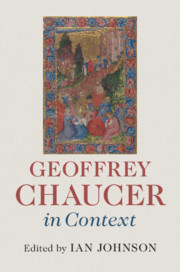Book contents
- Geoffrey Chaucer in Context
- Geoffrey Chaucer in Context
- Copyright page
- Contents
- Illustrations
- Contributors
- Abbreviations
- Introduction
- Part I Chaucer as Context
- Part II Books, Discourse and Traditions
- Chapter 3 Chaucer’s Linguistic Invention
- Chapter 4 Chaucer and London English
- Chapter 5 Manuscripts and Manuscript Culture
- Chapter 6 Chaucer’s Books
- Chapter 7 Authority
- Chapter 8 Literary Theory and Literary Roles
- Chapter 9 Metre and Versification
- Chapter 10 Dialogue
- Chapter 11 Romance
- Chapter 12 Love
- Chapter 13 Chaucer and the Classics
- Chapter 14 The French Context
- Chapter 15 The Italian Tradition
- Chapter 16 The English Context
- Chapter 17 Chaucer’s Competitors
- Chapter 18 Boethius
- Part III Humans, the World and Beyond
- Part IV Culture, Learning and Disciplines
- Part V Political and Social Contexts
- Part VI Chaucer Traditions
- Further Reading
- Index
Chapter 6 - Chaucer’s Books
from Part II - Books, Discourse and Traditions
Published online by Cambridge University Press: 24 June 2019
- Geoffrey Chaucer in Context
- Geoffrey Chaucer in Context
- Copyright page
- Contents
- Illustrations
- Contributors
- Abbreviations
- Introduction
- Part I Chaucer as Context
- Part II Books, Discourse and Traditions
- Chapter 3 Chaucer’s Linguistic Invention
- Chapter 4 Chaucer and London English
- Chapter 5 Manuscripts and Manuscript Culture
- Chapter 6 Chaucer’s Books
- Chapter 7 Authority
- Chapter 8 Literary Theory and Literary Roles
- Chapter 9 Metre and Versification
- Chapter 10 Dialogue
- Chapter 11 Romance
- Chapter 12 Love
- Chapter 13 Chaucer and the Classics
- Chapter 14 The French Context
- Chapter 15 The Italian Tradition
- Chapter 16 The English Context
- Chapter 17 Chaucer’s Competitors
- Chapter 18 Boethius
- Part III Humans, the World and Beyond
- Part IV Culture, Learning and Disciplines
- Part V Political and Social Contexts
- Part VI Chaucer Traditions
- Further Reading
- Index
Summary
Chaucer’s works demonstrate that he was extremely well read. He engages intensively with major authors and texts of classical and medieval literature such as Boccaccio, Boethius, Dante, Ovid, Petrarch and the Romance of the Rose. He also frequently cites respected ‘authorities’, including the Bible and commentaries on it. For a layman, he appears to have had access to an unusually wide range of reading material. His love of books and reading is also represented in many of his works, where his fictional alter egos are often to be found poring over texts and sitting up reading late at night. Getting access to reading material would, however, not have been as easy as we might imagine from reading his works. Manuscripts were costly and probably hard to come by, especially well-copied and reliable ones. Chaucer may have borrowed books from wealthy patrons and well-connected friends, bought second-hand copies, or had access to the libraries of religious institutions.
- Type
- Chapter
- Information
- Geoffrey Chaucer in Context , pp. 50 - 57Publisher: Cambridge University PressPrint publication year: 2019

